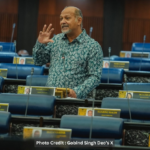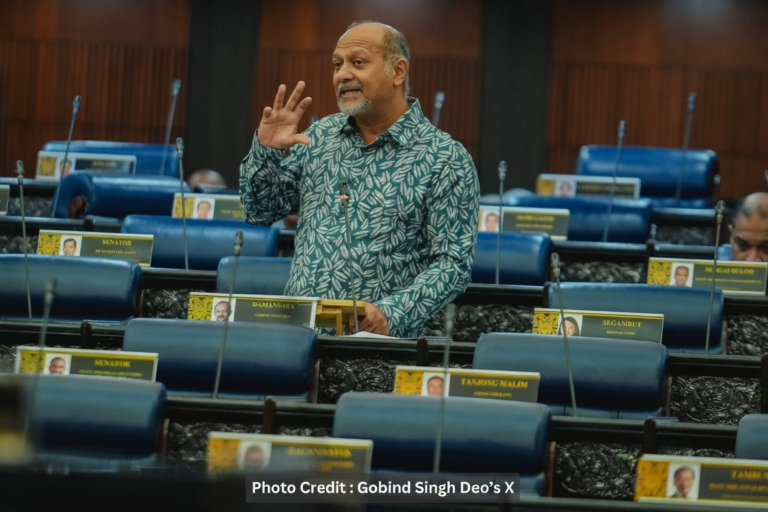
KUCHING, 3 Mei -- Orang ramai membeli barangan keperluan di kaunter khas bantuan Sumbangan Asas Rahmah (SARA) di pasaraya Mydin baru-baru ini. SARA merupakan usaha Kerajaan MADANI meringankan beban kos sara hidup golongan berpendapatan rendah menerusi bantuan dikreditkan ke MyKad penerima dengan mereka yang mendapat manfaatnya diperluaskan kepada 5.4 juta penerima bermula 1 April. -- fotoBERNAMA (2025) HAK CIPTA TERPELIHARA
By Mohammad Tariqur Rahman
In simpler terms, public policy consists of principles, laws, regulations, and actions that are adopted, monitored, or regulated by a government to address needs and issues of public concern. One can view public policy primarily in terms of ideas that govern principles and plans of action or as a collection of completed tasks and their outcomes.
The ultimate goal is simple – benefiting society and advancing the nation.

Simply put, the steering of planning and implementation of public policy remains in the hands of policymakers who are generally mandated by the voters as members of parliaments (at different layers, i.e., state or federal government).
Needless to say, voters represent a segment of citizens, and citizens represent a segment of the public in a society or a nation. While the idea of voters and citizens is straightforward, the concept of the public might remain elusive for many. The public represents the people living in a society or a country as a whole, which includes voters, citizens, and others such as expatriates, migrants, and refugees.
Hence, the question may arise: are public policies meant to address the needs and concerns of voters, citizens, or the public?
It could be noted that public concerns, including those of voters and citizens, may go beyond the national boundaries. The New York mayor-elect Zohran Mamdani, could be the best example to explain that. He was elected not only because of his proposed policies for national issues, but also for international issues such as the Israeli invasion of Palestine.
With this backdrop of a broader perspective of public policy, it might be interesting to evaluate how different paradigms of public policy and administration address the needs and concerns of voters, citizens, and the public differently.
Dr. Ora-orn Poocharoen, Director of Public Policy School, Chiang Mai University, during a public policy forum at the International Conference on Public Policy and Leadership 2025 (ICPPL 2025) organized by the International Institute of Public Policy and Management (INPUMA) at the University of Malaya, presented five paradigms of public policy and administration.
In its earliest (ancient) paradigm, public administrative policies were in the autocratic grip of elites or royals to rule the rest, the commoners, who remained loyal and obedient to their rulers. In contrast to the earliest paradigm, law and rule-based public administration policies of the traditional paradigm follow a bureaucratic approach to row, in contrast to rule, the voters. People were elevated from commoners to voters with the paradigm shift from ancient to traditional public administration.
A further shift in the paradigm resulted in new public management or new public governance to steer customers or to facilitate citizens, respectively. While the new public management is based on indicators and outcomes and characterized by a competitive approach, the new public governance is based on relationships and trust and has a collaborative approach. In these paradigms, public policies addressed the needs and concerns of customers or citizens, beyond the boundary of voters.
Finally the fifth paradigm, called smart sustainable governance, is characterized by its constructive approach and is based on sustainability and justice. The smart sustainable governance is meant for the public that includes voters, customers, and citizens, i.e., the people as a whole living in the society or in a country.
The key differences between the fifth paradigm and the earlier ones are clear. Unlike other paradigms, a sustainability and justice-based policy-making paradigm is meant for the needs and concerns of everyone living in society.
Inclusivity in smart sustainable governance is not only meant for people but also for technological applications in accessibility, decision-making, transparency, and accountability.
Indeed, it is much easier said than implemented a smart, sustainable governance. The complexity of bringing smart sustainable governance in practice increases with multi-ethnic, multi-racial, or migrant dependent countries.
Often, priorities for the needs and concerns of one ethnic or racial community over the other’s contradict the rule of justice, failing the fundamentals of a smart, sustainable governance system.
Hence, a key to the success of smart sustainable governance would depend not only on the policy taken by the policymakers but also on the attitude and sense of justice of the implementers and beneficiaries of the policies.
It is to be noted that the holistic success of a public policy depends on how the public, including voters and citizens, is educated on societal and technological advancement in the journey of prosperity. Equally, if not more, important is to enlighten voters and citizens with empathy and a sense of justice for everyone in the society, rather than to act and demand selfish fulfilment.

Prof Mohammad is the Deputy Executive Director (Development, Research & Innovation) at International Institute of Public Policy and Management (INPUMA), Universiti Malaya


















